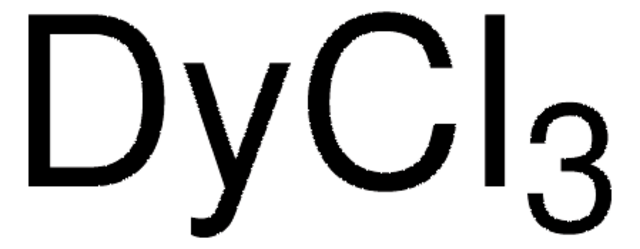439649
Thulium(III) chloride
anhydrous, powder, 99.9% trace metals basis
Synonym(s):
Thulium trichloride
Sign Into View Organizational & Contract Pricing
All Photos(1)
About This Item
Linear Formula:
TmCl3
CAS Number:
Molecular Weight:
275.29
EC Number:
MDL number:
UNSPSC Code:
12161600
PubChem Substance ID:
NACRES:
NA.22
Recommended Products
grade
anhydrous
Quality Level
Assay
99.9% trace metals basis
form
powder
reaction suitability
core: thulium
reagent type: catalyst
SMILES string
Cl[Tm](Cl)Cl
InChI
1S/3ClH.Tm/h3*1H;/q;;;+3/p-3
InChI key
ILOTUXNTERMOJL-UHFFFAOYSA-K
Related Categories
General description
Thulium (III) chloride is an inorganic compound that can be used as a precursor in the synthesis of various thulium-containing compounds.
Application
Thulium(III) chloride can be used as a precursor for the synthesis of thulium-doped LaF3 nanoparticles.
accessory
Product No.
Description
Pricing
Signal Word
Warning
Hazard Statements
Precautionary Statements
Hazard Classifications
Eye Irrit. 2 - Skin Irrit. 2 - STOT SE 3
Target Organs
Respiratory system
Storage Class Code
11 - Combustible Solids
WGK
WGK 3
Flash Point(F)
Not applicable
Flash Point(C)
Not applicable
Choose from one of the most recent versions:
Certificates of Analysis (COA)
Lot/Batch Number
Don't see the Right Version?
If you require a particular version, you can look up a specific certificate by the Lot or Batch number.
Already Own This Product?
Find documentation for the products that you have recently purchased in the Document Library.
Customers Also Viewed
Enhanced Visible/NIR driven catalytic activity in presence of neodymium (Nd3+), for Yb3+ and Tm3+ doped NaYF4 nanoparticles
Singh S, et al.
Journal of Environmental Chemical Engineering, 9(5), 105813-105813 (2021)
Thulium doped LaF 3 for nanothermometry operating over 1000 nm
Ximendes EC, et al.
Nanoscale, 11(18), 8864-8869 (2019)
M Meignan et al.
Physics in medicine and biology, 29(8), 927-937 (1984-08-01)
Analytical ion microscopy, a method of surface microanalysis, is applied to the detection of trace elements in the lung. With this method it is possible to obtain images of the distribution of any element in lung tissue sections with a
Hai Huang et al.
Small (Weinheim an der Bergstrasse, Germany), 16(19), e2000708-e2000708 (2020-04-21)
The development of luminescent materials with concurrent multimodal emissions is a great challenge to improve security and data storage density. Lanthanide-doped nanocrystals are particularly appropriate for such applications for their abundant intermediate energy states and distinguishable spectroscopic profiles. However, traditional
Our team of scientists has experience in all areas of research including Life Science, Material Science, Chemical Synthesis, Chromatography, Analytical and many others.
Contact Technical Service













